
Girolamo Savonarola, OP or Jerome Savonarola was an ascetic Dominican friar from Ferrara and a preacher active in Renaissance Florence. He became known for his prophecies of civic glory, his advocacy of the destruction of secular art and culture, and his calls for Christian renewal. He denounced clerical corruption, despotic rule, and the exploitation of the poor.

Josquin Lebloitte dit des Prez was a composer of High Renaissance music, who is variously described as French or Franco-Flemish. Considered one of the greatest composers of the Renaissance, he was a central figure of the Franco-Flemish School and had a profound influence on the music of 16th-century Europe. Building on the work of his predecessors Guillaume Du Fay and Johannes Ockeghem, he developed a complex style of expressive—and often imitative—movement between independent voices (polyphony) which informs much of his work. He further emphasized the relationship between text and music, and departed from the early Renaissance tendency towards lengthy melismatic lines on a single syllable, preferring to use shorter, repeated motifs between voices. Josquin was a singer, and his compositions are mainly vocal. They include masses, motets and secular chansons.

Miserere is a setting of Psalm 51 by Italian composer Gregorio Allegri. It was composed during the reign of Pope Urban VIII, probably during the 1630s, for the exclusive use of the Sistine Chapel during the Tenebrae services of Holy Week, and its mystique was increased by unwritten performance traditions and ornamentation. It is written for two choirs, of five and four voices respectively, singing alternately and joining to sing the ending in one of the most recognised and enduring examples of polyphony, in this case in a 9-part rendition.

Psalm 51, one of the penitential psalms, is the 51st psalm of the Book of Psalms, beginning in English in the King James Version: "Have mercy upon me, O God". In the slightly different numbering system used in the Greek Septuagint and Latin Vulgate translations of the Bible, this psalm is Psalm 50. In Latin, it is known as Miserere, in Ancient Greek: Ἥ Ἐλεήμων, romanized: Hḗ Eleḗmōn), especially in musical settings. The introduction in the text says that it was composed by David as a confession to God after he sinned with Bathsheba.
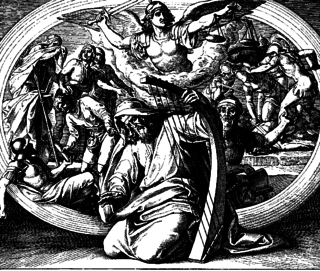
The Penitential Psalms or Psalms of Confession, so named in Cassiodorus's commentary of the 6th century AD, are the Psalms 6, 31, 37, 50, 101, 129, and 142.

Psalm 91 is the 91st psalm of the Book of Psalms, beginning in English in the King James Version: "He that dwelleth in the secret place of the most High shall abide under the shadow of the Almighty." In Latin, it is known as 'Qui habitat". As a psalm of protection, it is commonly invoked in times of hardship. Though no author is mentioned in the Hebrew text of this psalm, Jewish tradition ascribes it to Moses, with David compiling it in his Book of Psalms. The Septuagint translation attributes it to David.
Lupus Hellinck was a Flemish composer of the Renaissance. He was a prominent composer of masses, as well as German chorales and motets. Although he was a Roman Catholic all of his life, his music shows evidence of sympathy for the Protestant Reformation, and three of his motets—including a famous setting of In te domine speravi—were probably inspired by the prison writings of the martyred reformer Girolamo Savonarola.
The Miserere, by Josquin des Prez, is a motet setting of Psalm 51 for five voices. He composed it while in the employ of Duke Ercole I d'Este in Ferrara, in 1503 or 1504. It was one of the most famous settings of that psalm of the entire Renaissance, was hugely influential in subsequent settings of the Penitential Psalms, and was itself probably inspired by the recent suffering and execution of the reformer Girolamo Savonarola.

Ercole I d'Este KG was Duke of Ferrara from 1471 until 1505. He was a member of the House of Este. He was nicknamed North Wind and The Diamond.

Psalm 92 is the 92nd psalm of the Book of Psalms, beginning in English in the King James Version: "It is a good thing to give thanks unto the LORD". In the slightly different numbering system used in the Greek Septuagint and Latin Vulgate translations of the Bible, this psalm is Psalm 91. In Latin, it is known as "Bonum est confiteri Domino ". The psalm is known as Mizmor Shir L'yom HaShabbat, is ostensibly dedicated to the Shabbat day.

Psalm 93 is the 93rd psalm of the Book of Psalms, beginning in English in the King James Version: "The LORD reigneth, he is clothed with majesty". The Latin wording is Dominus regnavit, decorem indutus est. The Book of Psalms is part of the Hebrew Bible and the Christian Old Testament. In the slightly different numbering system of the Greek Septuagint and Latin Vulgate versions of the Bible, this psalm is Psalm 92. It is the first of a series of psalms which are called royal psalms as they praise God as King.
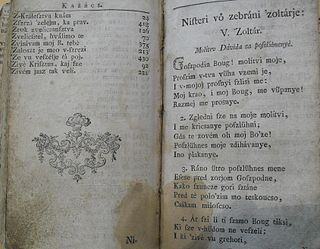
Psalm 5 is the fifth psalm of the Book of Psalms, beginning in English in the King James Version: "Give ear to my words, O LORD, consider my meditation". In Latin, it is known as "Verba mea auribus percipe Domine". The psalm is traditionally attributed to David. It reflects how the righteous man prays for deliverance not only for freedom from suffering, but to allow himself to serve God without distraction. The New King James Version entitles it "A Prayer for Guidance".
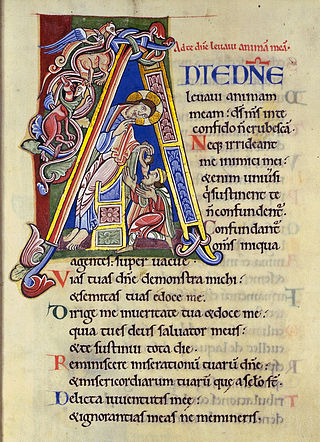
Psalm 25 is the 25th psalm of the Book of Psalms, beginning in English in the King James Version: "Unto thee, O LORD, do I lift up my soul.". The Book of Psalms is part of the third section of the Hebrew Bible, and a book of the Christian Old Testament. In the slightly different numbering system used in the Greek Septuagint and Latin Vulgate translations of the Bible, this psalm is Psalm 24. In Latin, it is known as "Ad te Domine levavi animam meam". The psalm, attributed to David, has the form of an acrostic Hebrew poem.

Psalm 138 is the 138th psalm of the Book of Psalms, beginning in English in the King James Version: "I will praise thee with my whole heart". In Latin, it is known as "Confitebor tibi Domine in toto corde meo". The psalm is a hymn psalm.

Psalm 49 is the 49th psalm of the Book of Psalms, beginning in English in the King James Version: "Hear this, all ye people; give ear, all ye inhabitants of the world". In the slightly different numbering system used in the Greek Septuagint version of the bible, and generally in its Latin translations, this psalm is Psalm 48. In the Vulgate, it begins "Audite haec omnes gentes". The psalm is attributed to the sons of Korah and is closely connected with the "Wisdom" or religious philosophy of ancient Israel.
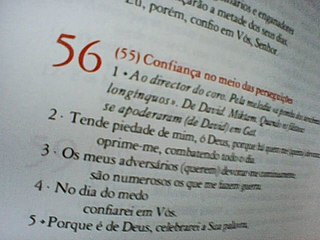
Psalm 56 is the 56th psalm of the Book of Psalms, beginning in English in the King James Version: "Be merciful unto me, O God: for man would swallow me up". In the slightly different numbering system of the Greek Septuagint version of the Bible and the Latin Vulgate, this psalm is Psalm 55. In Latin, it is known as "Miserere mei Deus quoniam conculcavit me homo". The psalm is the first of a series of five psalms in this part of the book which are referred to as Miktams. It is attributed to King David and may be considered representative of him or anyone else hiding from an enemy.

Psalm 57 is the 57th psalm of the Book of Psalms, beginning in English in the King James Version: "Be merciful unto me, O God, be merciful unto me". In the slightly different numbering system of the Greek Septuagint version of the Bible and the Latin Vulgate, this psalm is Psalm 56. In Latin, it is known as " Miserere mei Deus". It is attributed to King David, and is described as a Michtam of David, when he fled from the face of Saul, in the cave, recalling either the cave of Adullam, or the cave in the wilderness of En-gedi, on the western shore of the Dead Sea.

Psalm 63 is the 63rd psalm of the Book of Psalms, beginning in English in the King James Version: "O God, thou art my God; early will I seek thee". In the slightly different numbering system of the Greek Septuagint version of the Bible and the Latin Vulgate, this psalm is Psalm 62. In Latin, it is known as "Deus Deus meus". It is attributed to King David, set when he was in the wilderness of Judah, and its theme concerns being stranded in the wilderness away from one's family.
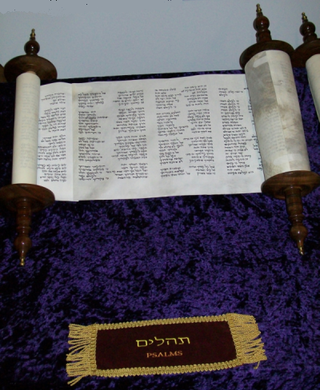
Psalm 116 is the 116th psalm of the Book of Psalms, beginning in English in the King James Version: "I love the LORD, because he hath heard my voice and my supplications". It is part of the Egyptian Hallel sequence in the Book of Psalms.

The Oxford Camerata is an English chamber choir based in Oxford, England. The Camerata was founded in 1984 by conductor Jeremy Summerly and singers David Hurley and Henrietta Cowling and gave its first performance on 22 May of that year. The ensemble consists of a core membership of fifteen singers, though personnel size varies according to the demands of the repertoire. While the Camerata is known for performing primarily unaccompanied repertoire, it has also performed accompanied repertoire, employing the services of the Oxford Camerata Instrumental Ensemble and the Oxford Camerata Baroque Orchestra.


















